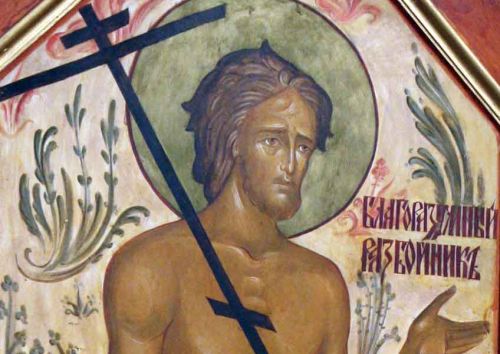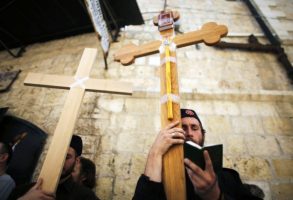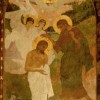And one of the malefactors which were hanging railed on Him, saying, If thou be Christ, save thyself and us. But the other rebuked him, saying, Dost thou not fear God, seeing thou art in the same condemnation? And we indeed justly; for we receive the due reward of our deeds: but this man hath done nothing amiss. And he said unto Jesus, Lord, remember me when Thou contest into Thy kingdom. And Jesus said unto him, Verily I say unto thee, Today shalt thou be with Me in paradise. (Luke 23:39-13)
This Is How the holy Evangelist Luke relates the edifying and moving incident concerning the conversion and the Lord’s pardoning of the thief who hung on the cross next to Him on Golgotha.
How did the thief deserve such mercy? What prompted such a quick and definitive response from the Lord? All the righteous figures of the Old Testament, including Saint John the Baptist, were still shut up in hades. The Lord Himself was preparing to descend into hades, not, of course, to suffer there, but to bring out the prisoners.
The Lord had not yet promised anyone to lead them into the Kingdom of Heaven; even the Apostles were promised to be taken into His mansions only after He had prepared them.
How is it that a thief was granted such mercy before anyone else? Why were the gates of Heaven opened so quickly for him? Let us examine the soul of the thief and the attendant circumstances.
His whole life had been one of theft and crime. But evidently his conscience had not died, and in the depths of his heart something good remained. Tradition even holds that he was that very thief who, during Christ’s flight into Egypt, took pity on the beautiful Baby and forbade his accomplices to kill Him, when they attacked the holy family. Did he perhaps recall the face of that Child when he looked upon the face of the One hanging next to him on the Cross?
Whether or not this actually occurred, when the thief looked upon Christ his conscience was awakened. There he was hanging next to the Righteous One, next to Him Who was comely in beauty more than the sons of men (Ps. 44:2), Whose form at that time was ignoble, and inferior to that of the children of men.. ., having neither form nor comeliness (Is. 53:2-3).
Gazing upon Him, the thief awoke as it were from a deep sleep. He saw clearly the difference between Him and himself. That One was without doubt a Righteous One, Who forgave even His tormentors and prayed for them to God, Whom He called His Father; while he was the killer of many victims, one who had shed the blood of people who had done him no harm.
Gazing upon the One hanging on the Cross, he saw as in a mirror his moral downfall. All the good concealed within him was awakened and surfaced. He came to a realization of his sins, he understood that it was his own fault that had brought him to this bitter end; he had no one to blame. Like the thief crucified on Christ’s left, he too had been gripped by hatred for the executioners, but this gave way to a feeling of humility and compunction. He felt fear at God’s coming judgment.
Sin became loathsome, dreadful. In his soul he was no longer a thief. There awakened in him feelings of love for mankind, merciful kindness. With his fear over the fate of his soul there was united a revulsion to the outrage being heaped upon the innocent Sufferer.
He had undoubtedly heard about the great Teacher and Wonderworker from Nazareth. What had occurred in Judea and in Galilee was the subject of many conversations and debates throughout the country. Previously, he had paid scant attention to any of this. Now, finding himself together with Him and in the same situation, he began to understand His moral greatness.
Christ’s lack of malice, His all-embracing forgiveness. His prayer, astonished the thief. He understood in his heart that beside him was no ordinary man. To turn to God as to One’s own father, in the hour of death, was possible only for Someone who truly knew Himself to be the Son of God. Not to waver in One’s teaching about love and unconditional forgiveness, to bear the humiliation of men’s slander and malice on the part of those to whom one has done good, was possible only for One who had the most intimate relationship with the source of Love, or Who was that Love.
 The thief recalled all the remarkable things he had heard about the One now crucified with him, and a warm feeling of faith was kindled in his heart. Yes, He was without doubt the Son of God, incarnate on earth while existing in uninterrupted communion with His Father; the Son of God, Whom the earth did not receive and Who was returning to Heaven; the Son of God, Who was able and powerful to forgive men their sins! That gave hope that the thief would escape condemnation at the Dread Judgment. If Jesus prayed to His Father for His hangmen,
The thief recalled all the remarkable things he had heard about the One now crucified with him, and a warm feeling of faith was kindled in his heart. Yes, He was without doubt the Son of God, incarnate on earth while existing in uninterrupted communion with His Father; the Son of God, Whom the earth did not receive and Who was returning to Heaven; the Son of God, Who was able and powerful to forgive men their sins! That gave hope that the thief would escape condemnation at the Dread Judgment. If Jesus prayed to His Father for His hangmen,
He would not refuse to do the same for the one crucified with Him. The thief need only turn to Him, Who now shared with him the same bitter suffering, and He would receive him into His blessedness.
True, his turning to Christ with words of love and sympathy would be met with jeers on the part of the angry crowd. To acknowledge Him as a holy man and the Son of God would mean drawing upon himself the attention and anger of the Hebrew elders. Although they could not cause him greater physical agony than he already endured, it would be painful to be surrounded by malice; how much more grievous his sufferings would be when they began to revile him likewise.
But what did he care now about the anger of earthly authorities, about men’s taunts. As painful as it was to be abandoned by men at the threshold of death, it would be still more painful to be abandoned by God. He was nearing God’s judgment, and it was God alone he need fear! In the final moments of life, he had to do whatever was still in his power to gain God’s good will.
Perhaps he could say something to ease His suffering even just a little, perhaps even just one of the blasphemers would be ashamed and stop slandering Him. Christ had promised to give a reward for a cup of water offered in His name; surely He would not leave him without recompense. Let those reviling Christ revile him also! This would tighten his bond with Christ! He was going to share Christ’s lot here; Christ would surely remember him when He came into His glory!
There, amidst the clamor of slander, blasphemy and derision, he began exhorting his companion hanging to the left of Christ to stop slandering Him. Dost not thou fear God, seeing thou art in the same condemnation? And we indeed justly: for we receive the due reward of our deeds: but this man hath done nothing amiss. And then from his lips came a humble voice: Remember me, O Lord, when Thou comest into Thy kingdom (Luke 23:40-42).
This was the cry of a former thief — now Christ’s new disciple — who came to believe in Christ at a time when His other disciples had abandoned Him.
“A thief blessed Him, while I denied Him” (Sedalion, Tone 5), Saint Peter lamented afterwards. At that time all the other Apostles likewise doubted the Lord. Even Saint John the Theologian, who had followed inseparably after his Teacher and was standing at the Cross on Golgotha, although he continued to be faithful to his beloved Jesus, even he did not then have complete faith in the Divinity of his Teacher. It was only after the Resurrection, after entering the empty tomb where lay the napkin and grave clothes which had wrapped Christ’s dead Body, only then did he “see and believe” that Christ had truly risen and was indeed the Son of God.
The Apostles wavered in their faith in Jesus as the Messiah, because they anticipated and desired to see in Him an earthly king, in whose kingdom they could sit at the right and the left hand of the Lord.
The thief understood that the Kingdom of Jesus of Nazareth, despised and given over to a shameful death, was not of this world. And it was precisely this Kingdom that the thief now sought: the gates of earthly life were closing after him; opening before him was eternity. He had settled his accounts with life on earth, and now he thought of life eternal. And here, at the threshold of eternity, he began to understand the vanity of earthly glory and earthly kingdoms. He recognized that greatness consists in righteousness, and in the righteous, blamelessly tortured Jesus he saw the King of Righteousness. The thief did not ask Him for glory in an earthly kingdom but for the salvation of his soul.
The faith of the thief, born of his esteem for Christ’s moral greatness, proved stronger than the faith of the Apostles, who, although captivated by the loftiness of Christ’s teaching, based their faith to a still greater extent on the signs and wonders He wrought.
Now there was no miraculous deliverance of Christ from His enemies — and the Apostles’ faith was shaken.
But the patience He exhibited, His absolute forgiveness, and the faith that His Heavenly Father heard Him so clearly, indicated Jesus’ righteousness, His moral superiority, that one seeking spiritual and moral rebirth could not be shaken.
And this is precisely what the thief, aware of the depth of his fall, craved. He did not ask to sit at the right or the left hand of Christ in His Kingdom, but, conscious of his unworthiness, he asked in humility simply that he be remembered in His Kingdom, that he be given even the lowest place.
Before everyone he openly confessed the Crucified Christ as Lord, and asked of Him the mercy of forgiveness.
His humble faith in Christ made him a confessor. By his own volition he was even a martyr, for he did not fear to recognize as his Lord the rejected “King of the Jews” — on Whom was concentrated the hatred of the multitude who had gathered in Jerusalem from all corners of the world for the Passover, and who, together with their elders and priests, were blaspheming Christ. The thief would not have feared even to suffer for Him.
Thus, the earnest repentance of the thief gave birth to humility, and together with this turned out to be a solid foundation for a strength of faith which at that time not even Christ’s closest disciples possessed. The converted thief performed a spiritual feat which not one of them was then capable of doing.
Whoever shall confess Me before men, him will I confess also before My Father which is in heaven (Matt. 10:32).
The thief confessed Christ; he confessed Him before a whole multitude who were railing at Him; he confessed Him then when no one else dared, and when even those few disciples and women who remained faithful to Him manifested their love for Him only with their bitter tears.
The thief did what once the three youths in Babylon did, refusing to bow down before the golden idol which Nebuchadnezzar had set up on the plain of Dura and before which “all nations, tribes and tongues” bowed down (Dan. 3:7).
The thief came to belief in the suffering Lord; confessing Him as “the hidden God,” he came to know Him before anyone else, and the power of His resurrection, and participation in His sufferings, being made conformable unto His death (Phil. 3:10); he understood before anyone else what constitutes the Kingdom not of this world; he came to know what is truth (John 18:36-38).
He was the first to comprehend the nature of Christ’s Kingdom, and therefore he was the first to enter it.
He was the first to see Jesus Christ and Him crucified (I Cor. 2:2), the first to preach Christ crucified, to the Jews a stumblingblock, to the Greeks foolishness, But unto them which are called, both Jews and Greeks, Christ the power of God and the wisdom of God (I Cor. 1:23-24).
For this reason he was also first to personally experience the power and wisdom of God, the power of Christ’s co-suffering and regenerating love; he was first to hear “the sound of the power of the Cross, for through it Paradise was opened.” (Fourth Ode, Ascension Canon)
His thorough repentance of his sins and transgressions, his profound humility, his firm faith in the Crucified Lord Jesus Christ Who gave Himself over to suffering, and his confession, made at a time when the whole world was against Christ — these are the strands which wove the crown that adorned the head of the former thief, this is the substance of which the key was forged that opened to him the gates of Paradise!
Many people sin, trusting to repent just before death; they point to the example of the wise thief. But is anyone capable of what he did? “The Lord pardoned the thief at the final hour so that no one would despair. But it was a single instance, that no one should have immoderate hope in His mercy” (Blessed Augustine).
“Such was his end! What ours will be we do not know — neither do we know by what death we will die: whether it will come suddenly or with some sort of forewarning” (Saint Theodore Studite, “Lesson on the occasion of a monk’s sudden death”).
Will we then be capable of a moral transformation and rise up spiritually like Christ’s “fellow traveler/’ “who let out a small voice and gained great faith? Will a sudden death not carry us away, deceiving our hope of repentance at the last minute?” (Saint Cyril of Alexandria, “On the Dread Judgment,” printed in The Great Horologion).
For this reason, “sinner, do not postpone repentance, that your sins not accompany you into the other life and weigh you down with an intolerable burden” (Blessed Augustine, in The Sunflower of Saint John of Tobolsk, Book 4, chap. 5).
May the example of the wise thief prompt us not to postpone repentance but to crucify ourselves with Christ (Gal. 2:19) and more earnestly repent, that we too might experience upon ourselves the mercy of co-suffering. (Prayer of Saint Symeon the New Theologian) They that are Christ’s have crucified the flesh with its affections and lusts (Gal. 5:24). Let us be zealous for our speedy and complete inner amendment, wholly giving ourselves over to the will of God and asking of Christ mercy and grace.
“Do Thou, Who alone lovest mankind, grant us the repentance of the thief as we serve Thee with faith, O Christ our God, and cry to Thee: Remember us also in Thy kingdom” (verse on the Beatitudes, Tone 4).
“O Lord, this very day hast Thou vouchsafed the Good Thief Paradise. By the Wood of the Cross do Thou enlighten me also and save me” (Exapostilarion, Matins of Holy Friday).




















